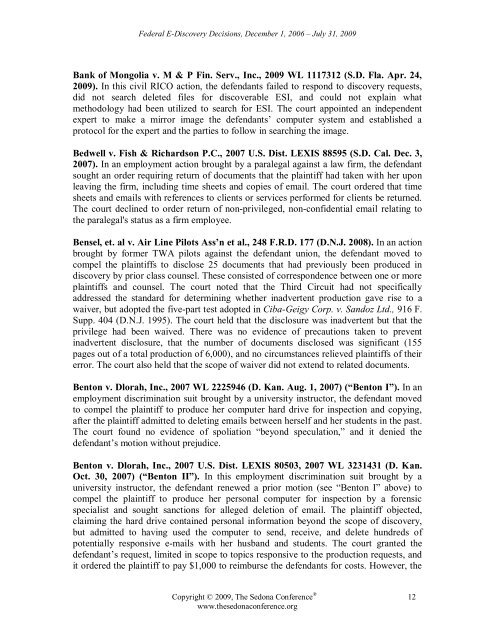Federal Court Decisions Involving Electronic Discovery, December 1 ...
Federal Court Decisions Involving Electronic Discovery, December 1 ...
Federal Court Decisions Involving Electronic Discovery, December 1 ...
Create successful ePaper yourself
Turn your PDF publications into a flip-book with our unique Google optimized e-Paper software.
<strong>Federal</strong> E-<strong>Discovery</strong> <strong>Decisions</strong>, <strong>December</strong> 1, 2006 – July 31, 2009<br />
Bank of Mongolia v. M & P Fin. Serv., Inc., 2009 WL 1117312 (S.D. Fla. Apr. 24,<br />
2009). In this civil RICO action, the defendants failed to respond to discovery requests,<br />
did not search deleted files for discoverable ESI, and could not explain what<br />
methodology had been utilized to search for ESI. The court appointed an independent<br />
expert to make a mirror image the defendants’ computer system and established a<br />
protocol for the expert and the parties to follow in searching the image.<br />
Bedwell v. Fish & Richardson P.C., 2007 U.S. Dist. LEXIS 88595 (S.D. Cal. Dec. 3,<br />
2007). In an employment action brought by a paralegal against a law firm, the defendant<br />
sought an order requiring return of documents that the plaintiff had taken with her upon<br />
leaving the firm, including time sheets and copies of email. The court ordered that time<br />
sheets and emails with references to clients or services performed for clients be returned.<br />
The court declined to order return of non-privileged, non-confidential email relating to<br />
the paralegal's status as a firm employee.<br />
Bensel, et. al v. Air Line Pilots Ass’n et al., 248 F.R.D. 177 (D.N.J. 2008). In an action<br />
brought by former TWA pilots against the defendant union, the defendant moved to<br />
compel the plaintiffs to disclose 25 documents that had previously been produced in<br />
discovery by prior class counsel. These consisted of correspondence between one or more<br />
plaintiffs and counsel. The court noted that the Third Circuit had not specifically<br />
addressed the standard for determining whether inadvertent production gave rise to a<br />
waiver, but adopted the five-part test adopted in Ciba-Geigy Corp. v. Sandoz Ltd., 916 F.<br />
Supp. 404 (D.N.J. 1995). The court held that the disclosure was inadvertent but that the<br />
privilege had been waived. There was no evidence of precautions taken to prevent<br />
inadvertent disclosure, that the number of documents disclosed was significant (155<br />
pages out of a total production of 6,000), and no circumstances relieved plaintiffs of their<br />
error. The court also held that the scope of waiver did not extend to related documents.<br />
Benton v. Dlorah, Inc., 2007 WL 2225946 (D. Kan. Aug. 1, 2007) (“Benton I”). In an<br />
employment discrimination suit brought by a university instructor, the defendant moved<br />
to compel the plaintiff to produce her computer hard drive for inspection and copying,<br />
after the plaintiff admitted to deleting emails between herself and her students in the past.<br />
The court found no evidence of spoliation “beyond speculation,” and it denied the<br />
defendant’s motion without prejudice.<br />
Benton v. Dlorah, Inc., 2007 U.S. Dist. LEXIS 80503, 2007 WL 3231431 (D. Kan.<br />
Oct. 30, 2007) (“Benton II”). In this employment discrimination suit brought by a<br />
university instructor, the defendant renewed a prior motion (see “Benton I” above) to<br />
compel the plaintiff to produce her personal computer for inspection by a forensic<br />
specialist and sought sanctions for alleged deletion of email. The plaintiff objected,<br />
claiming the hard drive contained personal information beyond the scope of discovery,<br />
but admitted to having used the computer to send, receive, and delete hundreds of<br />
potentially responsive e-mails with her husband and students. The court granted the<br />
defendant’s request, limited in scope to topics responsive to the production requests, and<br />
it ordered the plaintiff to pay $1,000 to reimburse the defendants for costs. However, the<br />
Copyright © 2009, The Sedona Conference ® 12<br />
www.thesedonaconference.org
















